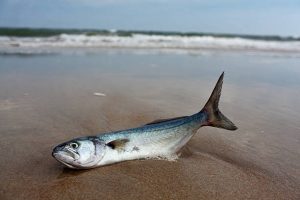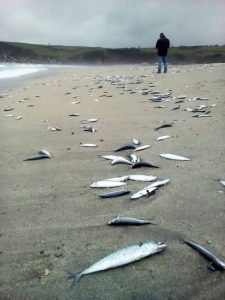Reasons why Fishes are washed ashore

Mass washout events of fishes occur intermittently both across our sea, beaches and over time. Which is usually as a result of changes in wind patterns and water temperature in the water body which a direct impact to sea life and productivity.
The following are major causes that contribute to fish being washed ashore:
Water Temperature : Warmer temperatures reduced the availability of oxygen, causing fish to suffocate and wash up on shore. Increase in water temperature results to little oxygen in the water. Fish and every other oxygen-breathing organisms depends on the dissolved oxygen in the water to breathe. Plants and other organisms create oxygen as a byproduct of photosynthesis during daylight hours. However, when the sun sets, oxygen production stops, while aquatic life continues to require oxygen for survival. Typically, there’s enough oxygen in the water to sustain aquatic life overnight. However, warmer water holds less oxygen than colder water. As a result, fish can suffocate during summer nights when oxygen levels drop too low.
Natural Causes:
Upwelling: Cold, nutrient-rich water rises to the surface, bringing oxygen-deprived water with it. Fish unable to adapt to the sudden change may suffocate and wash ashore.

Red Tide:
Harmful algal blooms can produce toxins that kill marine life, leading to mass strandings.
Disease outbreaks: Fish affected by diseases may become weak and unable to swim against currents, resulting in them being washed ashore.
Strong currents and storms: Extreme weather conditions can disorient and weaken fish, causing them to be swept onto the shore.
Spawning and migration: Some fish species, like sardines, may gather in large schools near the shore during spawning or migration, and strong currents can push them ashore.
Human-Induced Factors:
Pollution: Chemical spills, industrial waste, and agricultural runoff can contaminate water and harm marine life, leading to fish deaths.
Overfishing: Depletion of fish populations can disrupt the marine ecosystem, impacting the behavior and survival of remaining fish.
Climate change: Rising sea temperatures, ocean acidification, and changes in weather patterns can stress marine life and contribute to fish strandings.
Leave a Comment